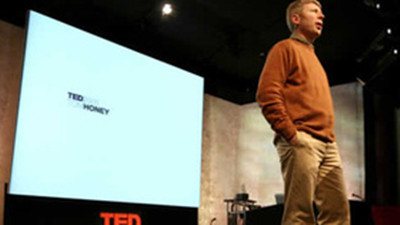(单词翻译:单击)
听力文本
I am a vicar in the Church of England.
我是一名英国圣公会的牧师。
I've been a priest in the Church for 20 years.
我做牧师已经有20年了。
For most of that time, I've been struggling and grappling with questions about the nature of God. Who is God?
在这20年的大部分时间里,我一直在努力解决和回答关于上帝本质的问题:上帝是谁?
And I'm very aware that when you say the word "God,"many people will turn off immediately.
我很清楚,当你一说起“上帝”这个词,很多人会立即走开。

And most people, both within and outside the organized church,still have a picture of a celestial controller,a rule maker, a policeman in the sky who orders everything,and causes everything to happen.
并且大多数人,无论是信教还是不信教的,心中还是认为上帝是这样一个形像:一个天上的主宰者,规则制定者,掌管一切的太空警察,万事万物发生的根源。
He will protect his own people,and answer the prayers of the faithful.
他会保护他创造的人类,并回应信徒们的祷告。
And in the worship of my church,the most frequently used adjective about God is "almighty."
在教堂里做礼拜,对上帝最常用的形容词是“全能”。
But I have a problem with that.
但我觉得这个观念是不对的。
I have become more and more uncomfortable with this perception of God over the years.
多年以来,我已经越来越对这个观念感到不舒服。
Do we really believe that God is the kind of male boss that we've been presenting in our worship and in our liturgies over all these years?
难道我们真的相信上帝是一个这么多年来我们在礼拜仪式和祷告中描述的那么一位男性的老板形像?
Of course, there have been thinkers who have suggested different ways of looking at God.
当然,曾经也有一些思想家建议用不同的方式来看待上帝。
Exploring the feminine, nurturing side of divinity.
比如:探索神的女性和育养的一面,
Suggesting that God expresses Himself or Herself through powerlessness,rather than power.
主张上帝是通过阴柔无力,而不是阳刚和力量,来呈现自己,不管是作为男性或者女性形像;
Acknowledging that God is unknown and unknowable by definition.
接受上帝本来就是未知的,也不可知的,这个定义,
Finding deep resonances with other religions and philosophies and ways of looking at life as part of what is a universal and global search for meaning.
寻找与其他宗教和哲学之间共同的内涵,以及作为全世界人类探索人生意义过程中看待生命的不同方式。
These ideas are well known in liberal academic circles,but clergy like myself have been reluctant to air them,for fear of creating tension and division in our church communities,for fear of upsetting the simple faith of more traditional believers.
这些想法在自由学术界是众所周知的,但像我自己这样的神职人员却不愿意公开宣扬它们,因为害怕在教会中会产生紧张气氛甚至分裂,害怕打破传统信徒的纯朴信仰。
I have chosen not to rock the boat.
我选择了不去惹麻烦。
Then, on December 26th last year, just two months ago,that underwater earthquake triggered the tsunami.
然而,去年12月26日,仅仅两个月前,海底地震引发了海啸。
And two weeks later, Sunday morning, 9th of January,I found myself standing in front of my congregation intelligent, well meaning, mostly thoughtful Christian people,and I needed to express, on their behalf, our feelings and our questions.
于是两个星期后,星期日上午, 1月9日,我站在我的会众面前,他们是一群智慧的、善良的、有思想的基督徒,我需要代表他们表达我们的感情和我们的疑问。
I had my own personal responses, but I also have a public role,and something needed to be said.
虽然我有自己的个人感受,但我还有一个公共角色,这时需要说点儿什么。
And this is what I said.
下面是我当时所说的话。
Shortly after the tsunami I read a newspaper article written by the Archbishop of Canterbury-fine title,about the tragedy in Southern Asia.
海啸发生后不久,我读了坎特伯雷大主教发表在报纸上的一篇文章,标题是:关于发生在南亚的悲剧。
The essence of what he said was this:
他所讲的精髓是这样的:
the people most affected by the devastation and loss of life do not want intellectual theories about how God let this happen.
因这场灾难和生命的逝去而饱受磨难的人们并不需要一个理论来解释上帝为何让这种事情发生。
演讲介绍
在2004年南亚海啸的悲剧发生后的几天里,汤姆·翰尼牧师一直思考这样一个问题:“慈爱的上帝怎么会做出这种事呢?”他在这个视频中回答的就是这个问题。


